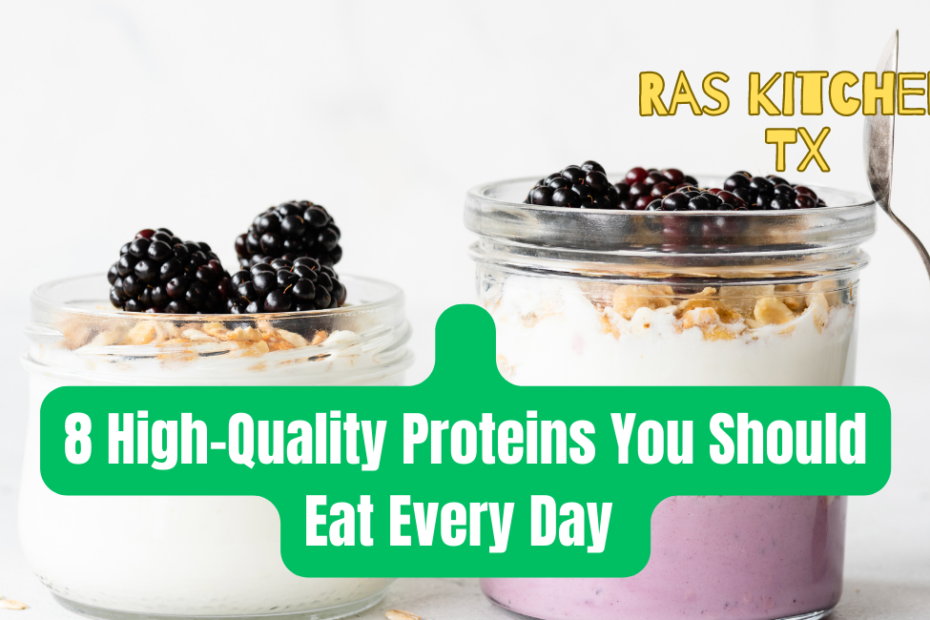Proteins are not all created equal. Some are of lower quality and contain fewer nutrients than others.
Protein is essential for cell and tissue repair, as well as for blood sugar regulation and hunger control. However, not all proteins are the same. You must include high-quality, lean protein on your plate to lose weight, get stronger, and improve your overall health.
When we say a protein is high-quality, we refer to two main factors. The first is that it contains a lot of nutrients without a lot of drawbacks. Fatty cuts of meat, for example, contain protein. Still, they are also high in artery-clogging saturated fat, sodium, and other unhealthy ingredients that not only crowd out some of the protein found in leaner animal products but also hurt health. So the best animal proteins contain beneficial nutrients while avoiding these negative factors.
The presence of all nine amino acids is the second factor distinguishing a high-quality protein. These amino acids are referred to as essential because they are required to form proteins, hormones, and neurotransmitters, and our bodies cannot produce them on their own; they must be obtained from food. When a protein contains all of the essential amino acids, it is called a complete protein. Animal proteins are all complete, but plant proteins are not. For example, vegetables are incredibly healthy and nutrient-dense, but they are not considered complete, so they are not on our list.
Continue reading to learn about the eight best high-quality animal and plant-based protein sources.
1. Greek yogurt
Try a bowl of Greek yogurt for a high-quality protein that works well as a snack or breakfast item.
Depending on the brand, Greek yogurt can contain 14-18 grams of protein, nine essential nutrients, and probiotics, good bacteria that can help your gut achieve a healthy bacterial balance.
Dairy frequently receives a bad rap but can provide numerous health benefits. For example, a study published in Nutrients examined dairy consumption data and discovered that dairy foods are associated with a lower risk of heart disease deaths but not cancer or all-cause mortality. This is consistent with the Dietary Guidelines for Americans’ statements about the benefits of dairy to healthy eating patterns.
2. Dairy milk
Cow’s milk can be a delicious, high-quality protein to add to your daily diet, whether you drink it straight or mix it into high-fiber cereal in the morning.
Milk contains 13 essential nutrients per 8-ounce serving, including high quality protein; milk includes one gram of protein per ounce. It’s also worth noting that milk contains 12 of the 13 nutrients listed above—only vitamin D is added. Vitamin A is naturally present in milk and is counted as part of the fat removal process in low-fat or fat-free dairy.
3. Quinoa
Quinoa is a nutritious, adaptable grain used in various bowls, salads, and as a side dish to your favorite meals. Because it contains all amino acids, this whole grain is considered a complete, high-quality protein, but some experts argue that it should be viewed as a nearly complete protein due to lower amounts of specific amino. Nonetheless, it is a high-quality protein with various other nutrients, including fiber, folate, and antioxidants. In addition, Quinoa has been shown to help lower LDL cholesterol and manage weight.
4. Eggs
Eggs are frequently referred to as the best source of protein. Because they contain the most bioavailable amino acids, they are the gold standard.
For example, eggs have a biological value of 100, which measures how efficiently the body uses protein from the diet. Beef, on the other hand, receives an 80. Only whey protein has a higher biological value of 104.
Eggs are also high in choline, essential for brain development, memory, thinking, and mood.
5. Skinless chicken breast
Because they are naturally low in saturated fat and sodium, chicken and turkey breast, minus the skin, are ideal for building and repairing tissues and maintaining lean muscle. In addition, lean poultry breast contains the antioxidant selenium, essential for immune and thyroid health, and B vitamins, which are required for DNA synthesis, energy production, and brain health.
6. Salmon &sardines
These fatty fish are high-quality protein sources because they are high in protein, low in sodium and saturated fat, and high in omega-3 fatty acids, a type of fat that is anti-inflammatory and incredibly beneficial to the heart.
Omega-3 fatty acids also help raise HDL (good cholesterol), lower triglycerides, and protect the body from free radicals that can cause damage.
While this article is technically about high-quality proteins, eating salmon or sardines daily is probably not the best option for your wallet or taste buds. So instead, aim to eat fatty fish a few times weekly to ensure you get enough nutrients.
7. Tofu
Tofu, made by soaking, grinding, and crushing soybeans, is a complete protein containing all nine essential amino acids and about 9 grams of protein per 3-ounce serving of the firm variety. In addition, tofu is high in iron and calcium, as well as isoflavones, which appear to help protect against heart disease, osteoporosis, and some cancers.
8. Pistachios
Pistachios, another complete protein, is one of the snack nuts with the highest protein content, with about 6 grams of complete plant-based protein per serving.
They’re also high in fiber and unsaturated fat. Pistachios contain all three nutrients, making them a potent appetite suppressant to help you avoid overeating. Also, pistachios are high in potassium, including more than a whole banana in just two ounces. In one study published in Nutrition, those who ate pistachios had a more significant reduction in waist circumference than those who did not.
That’s all there is to it. We hope you find at least a few of these eight healthy, nutrient-dense, high-quality proteins to incorporate into your daily routine.
Learn more: 7 Old-Fashioned Ingredients That No One Uses Anymore
